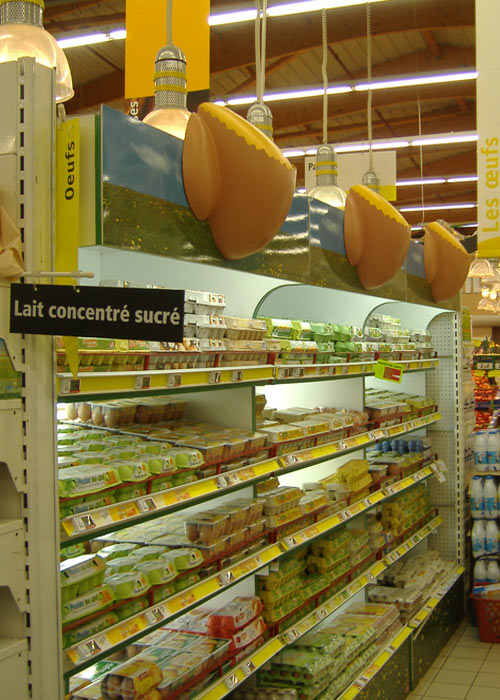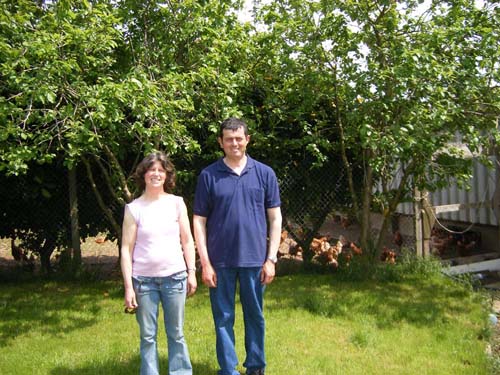
(This story appears in the May issue of the Ranger magazine. The magazine of the British Free Range Egg Producers Association). To enquire about receiving the Ranger magazine visit www.theranger.co.uk
Do Free Range producers in France operate in the same way as in Britain? Are their rules the same as ours? Are their eggs as good as ours? How have they coped with the rise in feed prices? What do French consumers want from their eggs? 'The Ranger' has been meeting French Free Range producers, industry representatives and retailers to find out the answers to these and other questions.
From the Nestbox to the Shelf
French producers are not contracted directly to a 'packer'. Typically their egg contract is with a production organisation (which can be a co-operative). The production organisation collects the eggs from their producers and supplies them to a 'packer'. The 'packer', who may be part of the food group but who operates as a separate business, is responsible for marketing and distribution including negotiating prices with the retailers. Price negotiations are conducted with the 'centrale d'achat' (buying centre) of each of the five leading hypermarket/supermarket groups: these are E. Leclerc, Carrefour, Auchan, Casino-Cora, and Intermarché. Most of the best-known French supermarket chains such as Champion, Monoprix etc. belong to one of these five groups.
No French supermarket has committed to Free Range, and Pascale Magdelaine, of ITAVI, says that at present it hard to imagine that this will ever happen. A letter was recently sent to the head of E. Leclerc asking the company if it would commit to selling only eggs produced in alternative systems. The response was negative; Leclerc will continue to offer the full range and leave the choice to the consumer. Battery eggs account for 70% of Leclerc's egg sales.

Food Groups
Major food groups (groupes agro-alimentaire) involved in egg production include Glon, Groupe Appro, Groupe LDC and CECAB (Central Co-operative Agricole Bretagne). The market-leading CECAB group was formed 40 years ago through the merger of five co-operatives in the Morbihan region of Brittany. It is structured into five operating divisions: agricultural activities, canned food, frozen food, meat, and eggs. Across these divisions it has around 8,000 producer members, all in Brittany. When CECAB first came into being in 1968 eggs were a small part of its activities; there were just 20 egg producers amongst its membership, with 60,000 hens between them. By 2006 this had grown to 75 egg producer members with a total of 1,678,000 hens, producing 487,000,000 eggs a year. Of these, 20% are non-cage. Eggs from CECAB's producers are supplied to Matines. It is Matines, and not CECAB, who markets the eggs and negotiates with the retailers.
Co-operatives are a strong force in French agribusiness, accounting for on average around 40% of the total 'agro-alimentaire' market. A report on the role of co-operatives by Coop de France in 2005 analysed their share of the marketplace by sector and found that it varied from around 90% down to 20% or even less; in the case of eggs, it was 30%. In keeping with the co-operative ethos, these groups have a history of working closely with the producer, for instance by selling feed to their producers at discounted prices and providing advice and assistance in business matters such as building a new poultry house. Nine out of ten French farmers belong to at least one farmers co-operative.
Free Range Egg Brands
There are a number of strong national brands that dominate the retail marketplace. Packers sometimes use two brand names to differentiate between products; Group Appro, for instance, markets its eggs from alternative production systems as La Mère Poulard and its cage eggs as Lustucru; CECAB's Label Rouge Free Range are branded Mas d'Auge. There may be a range of specialities within one 'label' such as standard Free Range, Label Rouge, Free Range Omega 3, Organic, Organic Omega 3, etc. In many cases the brand is supported by a website where customers can find out more about how the eggs were produced, general information about eggs, recipes etc. Cocorette has an English version of their website at http://web.lerelaisinternet.com/cocorette/an/index.php; Cocorette sells only Free Range eggs that have been laid in straw nests, collected by hand and produced on farms that keep only a very small number of hens. It is claimed that after the hen has laid an egg is laid in straw she sits on it for a short time while the shell dries, and this makes shell less porous to microbes.
Leading egg brand Matines was launched in 1985 as a co-operative venture between ten regional organisations. The brand rapidly gained a large share of the market, and Matines became a company in its own right in 1990. Free Range eggs were introduced into its range 1987 and organic in 1992.
Another major brand is Loué, produced by member of the farmers co-operative CAFEL (Co-operative Agricole des Fermiers de Loué) which celebrates its 50th anniversary this year. CAFEL has a significant part of the chicken market. Its chicken is also sold under the Loué label; Loué Label Rouge chicken is very well known. A claim to fame is that CAFEL was the first farmers organisation to advertise on TV, with an advert for its chicken. The Loué egg range includes Label Rouge and Bio.
La Mère Poulard is the brand name for free range and organic eggs of Groupe Appro, which has a large share of the total retail egg market in France. We hope to report on an interview with M. Philippe Lalère, Marketing Director of Groupe Appro, in a future of edition of the Ranger, where we will invite him to explain in more detail the relationship between producer, food group and packer, the different types of egg contracts that producers can enter into, and the factors that are most important to consumers.
A very marked new trend is that the supermarkets' 'own brand' eggs have massively increased their share of the market in recent years. ITAVI's recent study shows that of total egg sales in supermarkets and hypermarkets in 2007, 'own brands' accounted for 52% of volume and 48% of value.
Adding Value through Freshness
French consumers are particularly concerned with freshness, so one way of 'adding value' in all sectors, from organic to battery, is by stamping each individual egg with the date it was laid as well as the 'best before' date. Appro Lustucru was the first brand to do this, around four years ago, and was also the first to introduce extra fresh eggs (again, in the battery sector) that are brought onto the shelves within 24 hours of being laid. Boxes of eggs stamped with the date laid, and promising extra freshness, account for a large proportion of speciality eggs.
There's Free Range ... and there's Label Rouge
'Label Rouge' is the big success story of the Free Range industry in France. The 'Label Rouge' scheme is a premium quality mark for free range poultry products, both eggs and meat. The scheme was begun in 1985 for poultry and Free Range eggs were included in 1998. Label Rouge imposes more stringent production standards than required under European legislation. The rules for Label Rouge have been approved by the French Ministry for Agriculture, and strict quality control is carried out by independent assessment bodies.
Label Rouge requires a lower external stocking density for hens. For standard Free Range production, producers in France must observe an external stocking density of 4 square metres minimum per hen (i.e. 2,500 hens per hectare) and an internal stocking density of 9 hens per square metre, with 4 levels permitted in multi-tier systems. For Label Rouge producers, the internal stocking level is the same, but the external requirement is 5 square metres minimum per he
